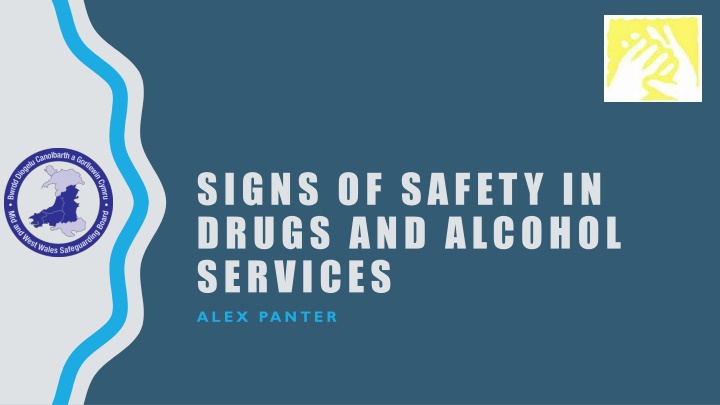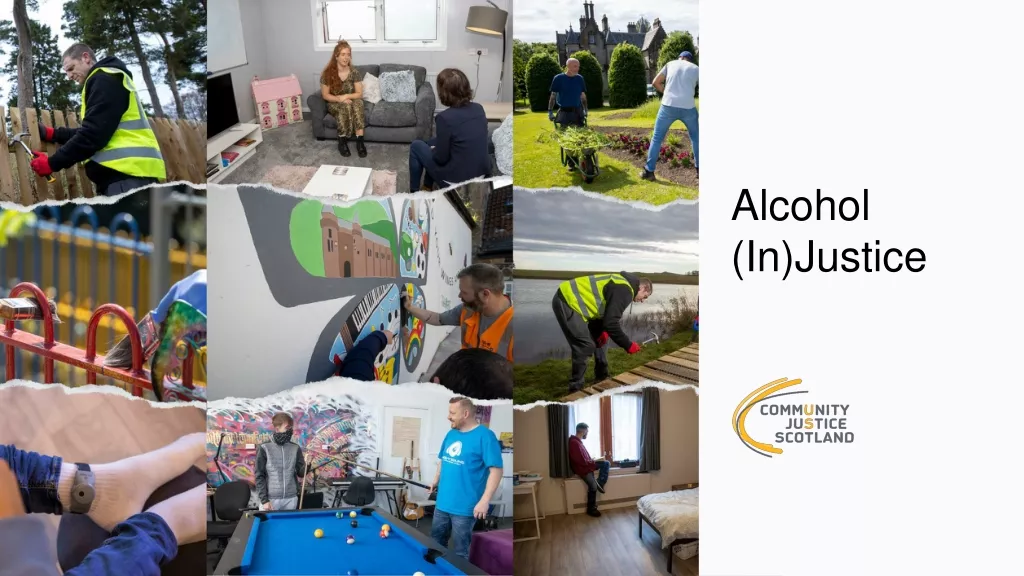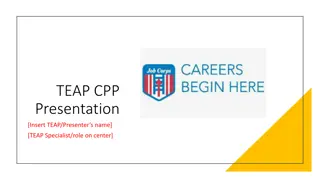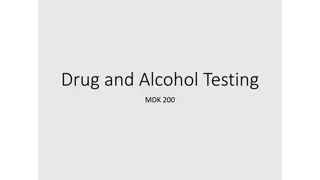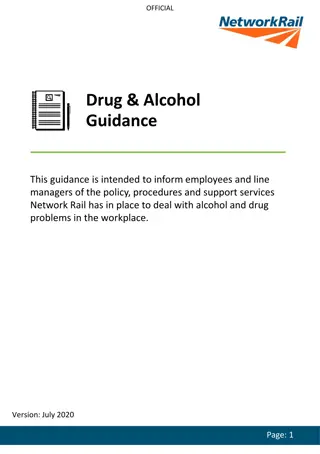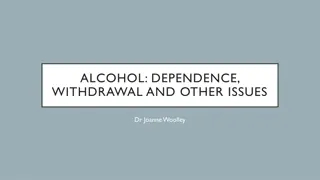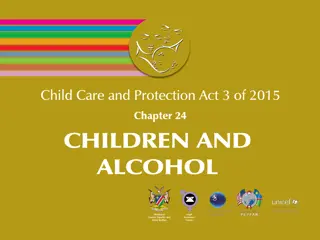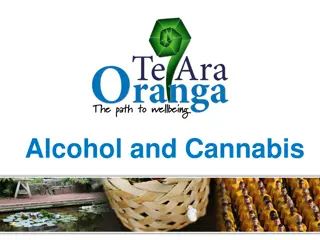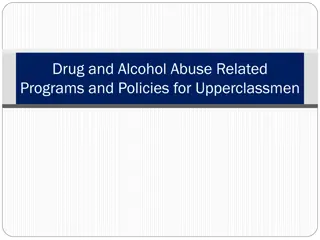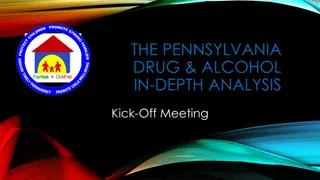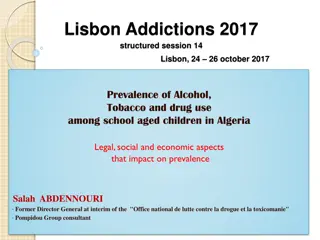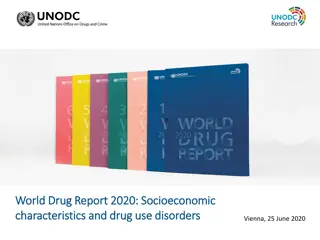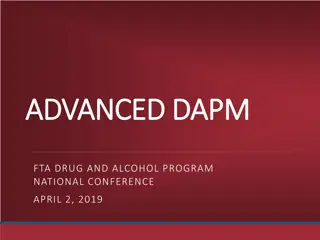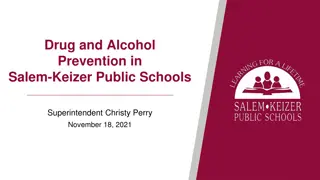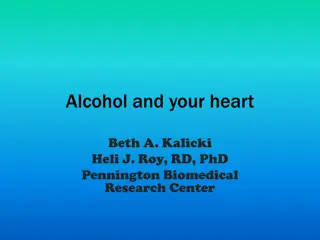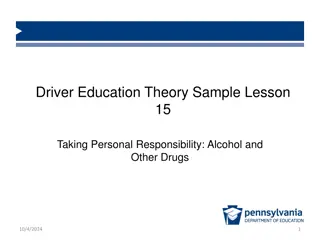Significance of Safety Practices in Drug and Alcohol Services
Exploring the importance of safety practices in drug and alcohol services with a focus on signs of safety, informed assessments, person-centered approaches, motivational interviewing, solution-focused strategies, strengths-based methods, and the miracle question. Emphasizing collaboration with families for inclusive care and support.
Uploaded on Sep 18, 2024 | 2 Views
Download Presentation

Please find below an Image/Link to download the presentation.
The content on the website is provided AS IS for your information and personal use only. It may not be sold, licensed, or shared on other websites without obtaining consent from the author.If you encounter any issues during the download, it is possible that the publisher has removed the file from their server.
You are allowed to download the files provided on this website for personal or commercial use, subject to the condition that they are used lawfully. All files are the property of their respective owners.
The content on the website is provided AS IS for your information and personal use only. It may not be sold, licensed, or shared on other websites without obtaining consent from the author.
E N D
Presentation Transcript
SIGNS OF SAFETY IN DRUGS AND ALCOHOL SERVICES ALEX PANTER
SIGNS OF SAFETY INFORMS Assessment Care Planning Review Closure
PERSON CENTRED Motivational Interviewing Solution Focussed Strengths based
MOTIVATIONAL INTERVIEWING What is going well? Could you say a bit more about that? What is it that you like about it? Why is it important to you that these things continue to go well? What are you worried about? What is it that you don t like about it? Can you tell me about the difficulties it causes you? Are there advantages to not making any change? What needs to happen? Are you able to say more about why you want to make this change? So what do you think you will do to try to get there?
SOLUTION FOCUSSED What is going well? what else, what else, etc. What are we worried about? - Has there been time when things were better? What did that look like? What was better about it? What needs to happen? - How will you know when you have achieved the changes you are looking to make?
STRENGTHS BASED What s working well? What is it you are doing to keep it that way? What are you worried about? Are you able to tell me some things that you can do to improve the situation? What needs to happen? Is there anything that you are doing or have done in the past that can help you achieve or maintain change?
THE MIRACLE QUESTION What needs to happen? You wake up tomorrow morning and life is exactly as you would like it to be, what does that look like? What are you worried about? So, what s in the way of you getting there? What s working well? Are you there in any way yet?
WE DO DO SIGNS OF SAFETY With families Inclusive everyone gets to share their hopes and concerns. Powerful hear what loved ones are most worried about. Shared mutual ownership of plans. Realistic goals you can t control behaviour but you can change your response to it.
CUSTOMER 47 YEAR OLD MALE, CHRONIC DEPENDENT ALCOHOL USE. ALCOHOL RELATED BRAIN DAMAGE. TREATMENT AND SUPPORT OPTIONS EXHAUSTED Who was involved? Customer His mother Two daughters Son Son in law Support Worker
WHATS WORKING WELL? Strengths Close family relationships Daughter moving near by Customer more involved with family Customer binges are shorter Customer understands and communicates more Customer remorse after binges Customer relationship with grandson Customer can express worries to family Managing money more positively Relationship with dog Tidy when sober Shopping independently Customer is a fun person Safety Family rejection when customer drinking
WHAT ARE WE WORRIED ABOUT? Customer is unpleasant when drinking Customer calls to daughters and young grandsons home when drunk. Customer neglect self and his home when drinking Customer loses his dog when drinking Customer leaves front door open when drinking Customer falls when cooking Customer taken advantage of by others when drinking Customer doesn t look after his health when drinking Daughter is running out of ideas to help customer Customer wets himself when drunk and daughter finds him in this state Customer is a worrier and self centred Daughter has to tidy up after customer Relationship breaking down with family Daughter is worried that customers behaviour when drunk will impact on her young child Customer has debt Customers life will be shortened by alcohol use Customer will end up in a care home at a young age Customer is lazy and diet is poor when drinking Customer doesn t bother with support offered
DANGER STATEMENTS Customer - worried about hurting grandson when attending daughters home intoxicated. Daughter worried dad won t stop drinking and will die too soon. Daughter worried dad will fall and bang his head when he is drinking and not eat. Son in law worried dad will lose his memory completely and not spend any time with his family. Son worried dad won t stop drinking and will die. Mother worried if anything happens to me and he has fallen out with the family, he will have no help. Support worker worried customers relationship with family will break down. Social worker worried that if Michael continues with alcohol use, his brain function will deteriorate and he will need residential care and family relationships will suffer.
WHAT NEEDS TO HAPPEN? Safety goals Customer not drinking at all Customer more physically fit Customer is remembering to lock front door Customer is looking after his dog Customers mental health is improved Customer won t be worrying There will be more family get togethers Having a laugh with customer Customer will play with young grandson Customer taking responsibility for himself Next Steps Customer will spend less time drinking and more time with his family Customer and son in law will exercise together Customer will seek support when something is worrying him Customer will attend health appointments If customer attends daughters home under influence and does not leave immediately on request the police will be called Customer to keep his front door locked
REVIEW TWO MONTHS LATER What s working well? Customer attended daughter s home on one occasion but did leave immediately on request Customer has reduced alcohol use Customer not worrying Customer taking responsibility for health Customer locking front door Customer is a laugh when sober Customer taking responsibility for self What are we worried about? Customer did call at daughters home once under influence Customer has had four binges that have worried family Customer and son in law have not exercised together Customer not spending enough time with family Customer has lost dog on one occasion Customer s mental health has not improved
WE DO DO SIGNS OF SAFETY Team meetings Stuck input from colleagues Reassurance exploring with colleagues who may come to the same conclusions Closure/maintenance knowing when to quit
